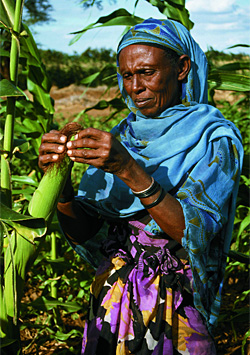
The increase in world agriculture prices caused by the global boom in biofuels could benefit many of the world’s rural poor, according to the Worldwatch Institute. This is one conclusion of a landmark new 450-page book, Biofuels for Transport: Global Potential and Implications for Energy and Agriculture.
“Decades of declining agricultural prices have been reversed thanks to the growing use of biofuels,” says Christopher Flavin, president of the Institute. “Farmers in some of the poorest nations have been decimated by U.S. and European subsidies to crops such as corn, cotton, and sugar. Today’s higher prices may allow them to sell their crops at a decent price, but major agriculture reforms and infrastructure development will be needed to ensure that the increased benefits go to the world’s 800 million undernourished people, most of whom live in rural areas.”
Biofuels for Transport, undertaken with support from the German Ministry of Food, Agriculture, and Consumer Protection, assesses the range of “sustainability” issues the biofuels industry will present in the years ahead, ranging from implications for the global climate and water resources to biological diversity and the world’s poor. The book finds that rising food prices are a hardship for some urban poor, who will need increased assistance from the World Food Program and other relief efforts. However, it notes that the central cause of food scarcity is poverty, and seeking food security by driving agricultural prices ever lower will hurt more people than it helps.
Continue reading Could BioFuels Be Good For The Worlds Rural Poor?